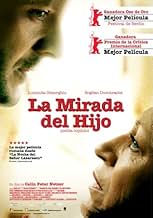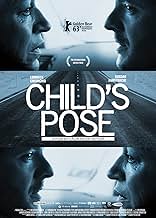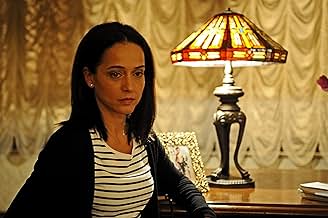Añade un argumento en tu idiomaAfter the terrible news of a fatal car accident involving her son, a desperate mother will do anything in her power to set her child free.After the terrible news of a fatal car accident involving her son, a desperate mother will do anything in her power to set her child free.After the terrible news of a fatal car accident involving her son, a desperate mother will do anything in her power to set her child free.
- Dirección
- Guión
- Reparto principal
- Premios
- 13 premios y 8 nominaciones en total
- Leontina Vaduva, the Soprano
- (as Leontina Väduva)
Reseñas destacadas
The story: Cornelia, a middle-aged high society architect, is informed by her sister-in-law that her son Barbu has killed a child in a traffic accident, and both immediately proceed to the police station where he is being held for questioning. They barge into the interrogation, all the while phoning useful contacts, and manage to change Barbu's statement, after which they take him back to his parent's house. In the following days, Cornelia develops various schemes to get Barbu off the hook of a trial, receiving unexpected support from Barbu's wife (or girl-friend) Carmen, even though they thoroughly hate each other.
The accident itself is not the main story. It serves as a backdrop for highlighting the blatant disregard of the rich for the poor, the pervasiveness of corruption in Romanian society, and to illustrate how possessive and self-serving Cornelia is. Most screen time is devoted to Barbu's 'cutting of the post-natal umbilical cord', his sometimes desperate, mostly half-hearted attempts to gain independence from his overprotective mother.
The strength of the film lies in the ambiguity of its characters, foremost Luminiţa Gheorghiu's Cornelia, which she brilliantly portrays as a vicious self-obsessed diva totally immune to the plight of others, and who is still thoroughly devoted to her son. The viewer is torn between disgust and pity for her, for instance, when stopping in front of the killed child's parents, she exclaims 'Damn, it's one of the better houses', indicating that her only interest is to buy the parents' consent to revoke their claim against Barbu. Yet when sitting with them at a table, she so tearfully describes her plight that one cannot help but feel moved. Barbu, on the other hand, is a hypochondriac and coward, who for most of the time cannot admit to what he has done, but when he argues with Cornelia to back off, one cannot help but wonder how he could have turned out any other way, given the obsessive nature of his mother.
The real icing on the cake, however, is a brief scene between Cornelia and the principal witness to the accident, whom she hopes to bribe. Vlad Ivanov (of 'Doctor Bebe' fame in '4 months 3 weeks 2 days') once again plays a cynical ruthless character who confronts the female protagonist with the fact that the situation forces her to do precisely what he wants - well, maybe not quite. This scene is the best of any Romanian film I have seen in the past five years and merits the price of the ticket alone.
What may elude a non-Romanian viewer of this film is that the title itself is also ambiguous, 'poziţia copilului' being a wordplay with 'poziţia corpului', which means 'position of the body', a term used in police reports to describe the location of an accident victim when found. This recalls 'poliţist, adjectiv' by Corneliu Porumboiu, which in 2009 won the Un Certain Regard Jury Prize in Cannes. That title is also a wordplay, and Netzer shares many stylistic resemblances with Porumboiu.
If the film isn't perfect, then because of Netzer's tendency for emotional overkill; he rides his protagonist's credibility a little too hard sometimes, as in his debut feature 'Maria' (2003). However, that film is still alive in my memory precisely because the misery of the main character was so all-encompassing, so he may be using exaggeration as an artistic tool. 'Child's Pose' is a little too obviously geared towards festival expectations rather than domestic audiences - Romanians tend to prefer their social criticism with a large dosage of humor, as in all-time favorite 'Filantropica' (2002) by Nae Caranfil. But since the acting is mostly nothing short of brilliant, these calculations do not harm the film's artistic value and social message.
Luminita Gheorghiu stars as Cornelia Keneres, a wealthy woman who dominates everyone with whom she comes into contact. Bogdan Dumitrache plays Barbu, her adult son, who clearly grew up under his mother's thumb, and has barely managed to achieve some measure of independence. However, Barbu has been involved in a fatal car accident in which he has killed a child. He's paralyzed with fear and regret, and that allows his mother to step back into his life to try to keep her son out of jail. (Barbu wasn't drunk when the accident occurred, but he was speeding and probably driving recklessly. We all know he's guilty.)
It's hard to have much sympathy for Barbu, who is sullen, uncommunicative, and somewhat strange. His intimate partner, Carmen, is about to leave him, because she can't tolerate his behavior any longer. (Carmen is played very well by the capable actor Ilinca Goia. She and Cornelia have an interesting--and intimate--conversation about Barbu. It's an extremely intense and unsettling scene.)
Of course, you could argue that Barbu is what he is because of his mother. It's a reasonable argument, although we can't be certain. In any event, Barbu, if left to his own devices, will go to jail. His mother defends against this possibility with all the ferocity of a mother tiger defending her cub.
The director makes it clear that in Romania--as in most places--money talks. Cornelia sets about to bribe the witness, bribe and bully the police, and manipulate the dead child's grieving parents. In fact, the only honest and untouchable person we meet is a young policewoman, and no one pays any attention to her.
This is a dark film about a dark situation. What makes it worth seeing is the outstanding performance by Luminita Gheorghiu as Cornelia. Gheorghiu was the star of the excellent film The Death of Mr. Lazarescu. In that movie she portrayed a working-class nurse, trying to save her patient and always facing closed doors. In this movie she is an elegant, sophisticated, architect, trampling over everyone to protect her son.
The parts are very, very different, but Gheorghiu has the talent to make us believe in her character in both roles. She is truly an incredible actor, and the film is worth seeing just to watch her on screen.
We saw this movie at the excellent Dryden Theatre at George Eastman House in Rochester, NY. It's primarily an intimate film, and will work very well on the small screen. In whatever format, it's worth finding and watching.
What sets Netzer's film apart from some of the other recent Romanian works of cinema is its sardonic humor which works best when it's aimed at the characters and not at some of the pervasive practices of society. I've personally always felt that personal stories, meaning character stories, always came in second to some grand piece of social commentary, usually on the communist background of the country, in most of the acclaimed Romanian cinema of the 21st century. Not to say that such commentary lacks relevance, but there's just more to modern life than its dark red heritage.
Of course, "Pozitia Copilului" is deeply rooted in antics which one could call symptomatic of Romania and as a means of characterization, the backdrop is justifiable. Occasionally though, when certain aspects come across a bit too hard pressed, they do a disservice to the otherwise excellent balance of a difficult story. This does in no way undermine the beautifully detailed portrait of the film's main character, a highly controlling, bossy, arrogant, mean-spirited mother whose faults go quite a way to being redeemed by the passionate dedication with which she tries to protect her son, who had killed a child in a car accident. The ambivalence is so finely portrayed by Luminita Gheorghiu that both the moments of involuntary humor and the moments of pure drama work just as well.
It's ironic that Mrs. Gheorghiu also played in "Moartea Domnului Lazarescu", a film I found to be close at heart with "Pozitia Copilului", in that it relies heavily on a complex central character and its critique is subtle, yet scathing. I'd go so far as to say that these kind of films, while still dominated by a type of post-modernist bleakness, can lead a shift of focus to the greater importance of characters as individuals in Romanian movies, not only as symbol stand-ins.
¿Sabías que...?
- CuriosidadesOfficial submission of Romania for the 'Best Foreign Language Film' category of the 86th Academy Awards in 2014.
- Citas
Cornelia Keneres: What did I do wrong?
Barbu: Never mind now. I'm putting this on the table. You can say yes or no. You either let me call you when I feel like it, or it's nothing. And a suggestion. If it's hard, find a substitute. A dog, a lover, a hobby. People your age visit the Pyramids.
Cornelia Keneres: Other people my age have a normal relationship with their child. Parents find their fulfillment in their children. Everything they failed to accomplish, they achieve through their children.
Barbu: So we're agreed.
Selecciones populares
- How long is Child's Pose?Con tecnología de Alexa
Detalles
Taquilla
- Presupuesto
- 850.000 € (estimación)
- Recaudación en Estados Unidos y Canadá
- 97.170 US$
- Fin de semana de estreno en EE. UU. y Canadá
- 12.955 US$
- 23 feb 2014
- Recaudación en todo el mundo
- 994.126 US$
- Duración1 hora 52 minutos
- Color
- Mezcla de sonido
- Relación de aspecto
- 2.35 : 1
Contribuir a esta página





























